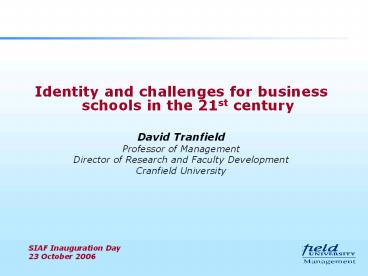Identity and challenges for business schools in the 21st century
1 / 9
Title:
Identity and challenges for business schools in the 21st century
Description:
Identity and challenges for business schools in the 21st century David Tranfield Professor of Management Director of Research and Faculty Development –
Number of Views:188
Avg rating:3.0/5.0
Title: Identity and challenges for business schools in the 21st century
1
- Identity and challenges for business schools in
the 21st century - David Tranfield
- Professor of Management
- Director of Research and Faculty Development
- Cranfield University
- SIAF Inauguration Day
- 23 October 2006
2
The History of Business Schools.
- Trade Schools Harvard Business School (1908)
vision that it would soon demonstrate a great
capacity for public usefulness (President
Eliot) - Search for academic respectability (1950s and
60s) Ford and Carnegie reports the
scientization of business schools using faculty
from associated disciplines. - Dislocation from practice What if the Academy
actually mattered? (Hambrick 1993) and other
debates
3
Business Schools with an identity crisis .
STRENGTHS
CHALLENGES
- Educating Students
- Single product - MBA
- Narrow thinkers lacking leadership ability
ethically questionable
- Strong business networks
- Lacks design science orientation
- Social science base
- Methodologically sound
- Lacks relevance
- Unable to build knowledge stocks
- Academically inclusive
4
Starkey et al (2006) positioning the Business
School .
- Social science model
- Professional school
- Value adding in the knowledge economy
- The humanities led school
5
Social science model .
- The dominant model
- .accomplished peers and a faculty known for its
Nobel Prizes Chicago GSB - Offers clarity for moments of truth
- Expects the power of knowledge to triumph
- BUT
- Often diverges from practice strange lack of
impactful contributions
6
Professional School .
- . to train for the practice of management as a
profession and develop knowledge relevant to
improving operations - Focused on change a clinical approach
- Dual role pursues knowledge both for its own
sake and for application - BUT
- Is it possible to achieve both goals?
7
Value adder in the knowledge economy .
- Has servicing role with other parts of the
University (Science, Technology, Engineering and
Medicine) - Offers both general management (conversion) and
specialised training for technical experts - Focused research agenda heavily context specific
- BUT
- Is this a viable operation both in a business
sense and academically?
8
Humanities led School .
- Management as a liberal art
- liberal deals with knowledge, wisdom,
leadership. - art concerned with practice and application.
- Reflexivity as a central tenet it would be
catastrophic to become a nation of technically
competent people who have lost their ability to
think critically, examine themselves and respect
humanity and the diversity of others (Martha
Nussbaum) - Design and creativity a reaction to technique
driven MBAs? - BUT
- Is this a distinct role for the business school
or a signal to link with departments in the
humanities?
9
A time for remaking?
- What will knowledge spaces look like in the
future? - Time to question market-smart, mission-centred?
- A place of public purpose or an agency of
personal advantage? - Back to the future? combinations of the four
models to move from market-smart,
mission-centred to knowledge-centred, learning
driven?































